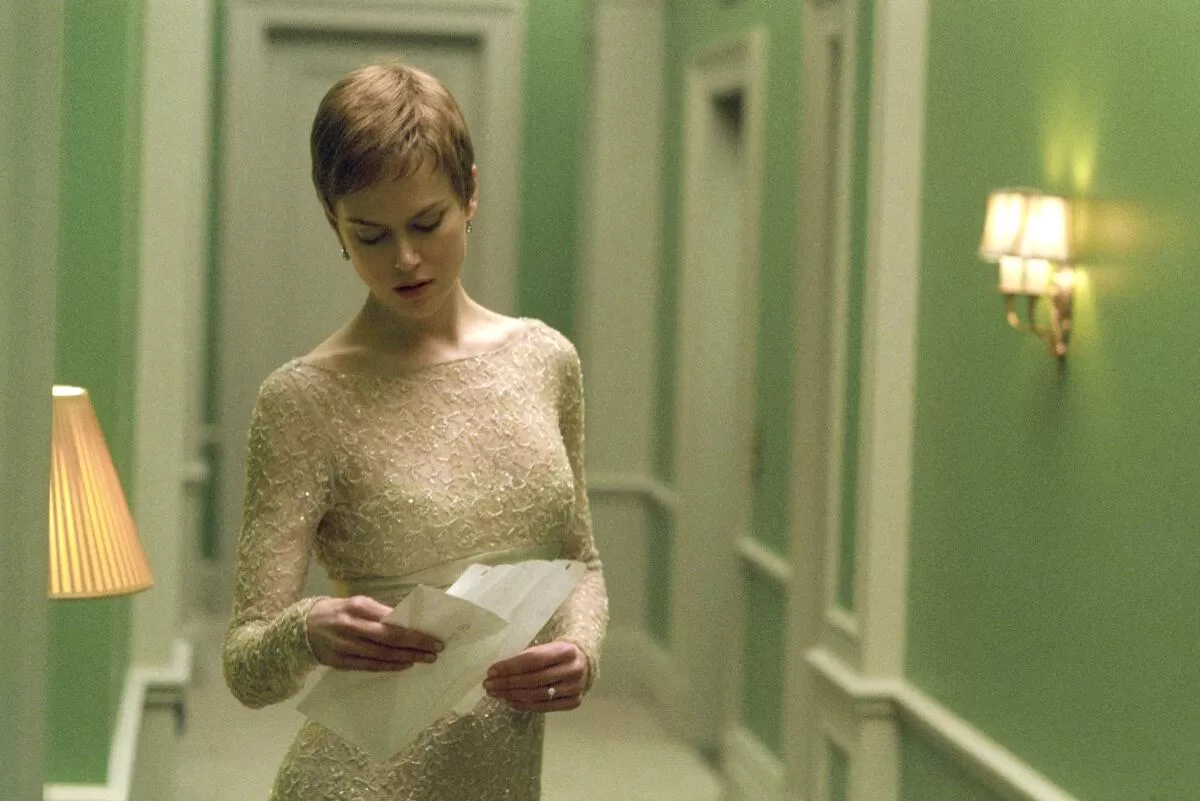This weekend in Los Angeles, Nicole Kidman will receive the American Film Institute’s Life Achievement Award in a ceremony that will be televised in June.
Kidman got on the phone with Glenn Whipp not so much for a general carer overview but for a very specific conversation about her performance in 2004’s “Birth.” Directed by Jonathan Glazer, who just won the Oscar for international feature for “The Zone of Interest,” the film was largely rejected by critics and audiences when it was first released but has over the years come to be seen as genuine achievement for its spooky atmosphere and air of unease.
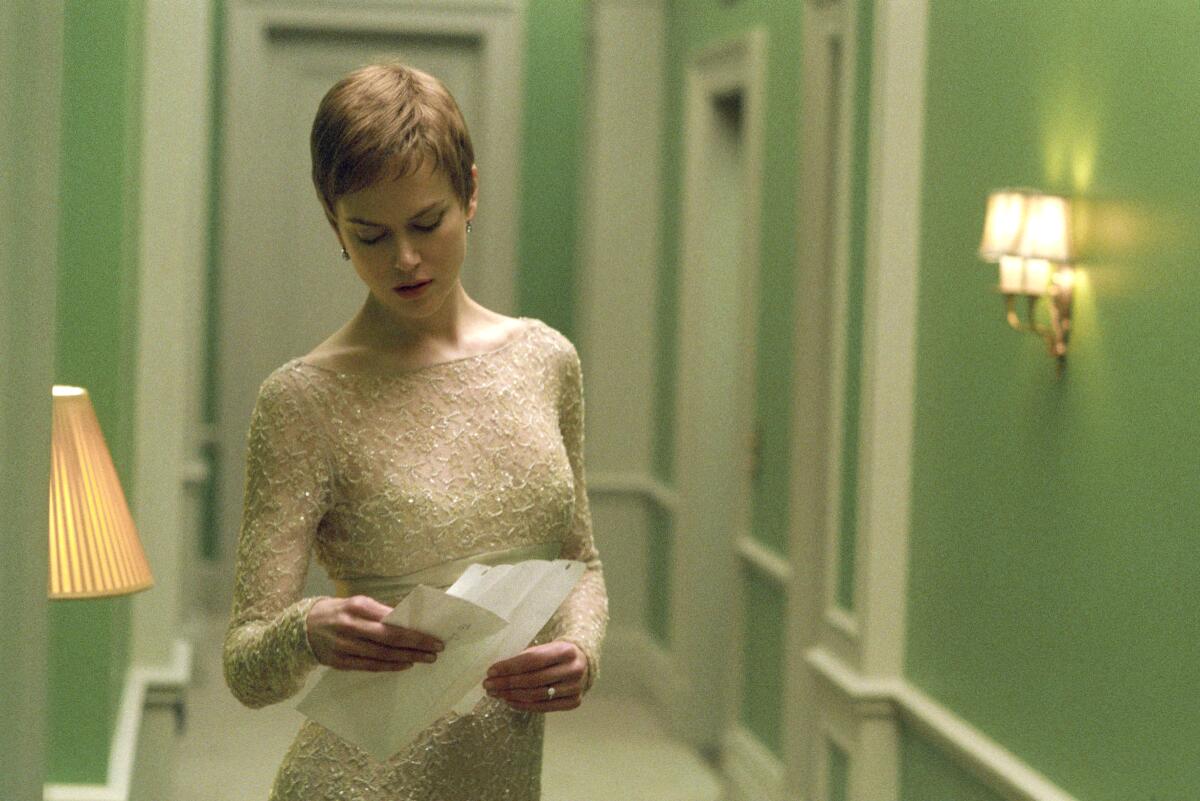
(James Bridges / Fine Line Features)
In the film Kidman plays a widow still grieving the untimely death of her husband a decade ago when a 10-year-old boy arrives at her apartment and announces himself as the reincarnation of her late spouse. And things only get more unsettling from there.
“I don’t find it strange, but maybe that means I’m strange,” Kidman said. “But I never found it strange. I found it profound, the way it deals with grief and how people will fill holes to explain things, needing to explain things and then being incredibly open to all possibilities when you’re in a deeply vulnerable state.”
Via email, Glazer said he cast Kidman knowing she had worked with directors such as Lars von Trier and Stanley Kubrick and that despite being a huge star, there was an edge to her work.
“I was nervous to cast her,” Glazer said. “I needn’t have been. I underestimated her ability to become anonymous. To immerse herself fully. I’d seen her in ‘Dogville.’ I loved that she did that. And ‘Eyes Wide Shut.’ It’s that fearlessness which attracted me, seeking out filmmakers who would challenge her.”
Spend a weekend with Patricia Rozema

Kate Nelligan in Patricia Rozema’s movie “White Room.”
(Kino Lorber)
The Academy Museum and the UCLA Film and Television Archive are co-presenting a weekend-long program devoted to the work of Canadian filmmaker Patricia Rozema.
Raised a Calvinist, Rozema did not see a movie until she was 16 years old (“The Exorcist,” if you can imagine that being the first film you ever saw). After attending Calvin College in Grand Rapids, Mich. — also the alma mater of Paul Schrader, more on that below — she headed to Toronto and eventually made her feature debut with 1987’s semiautobiographical “I’ve Heard the Mermaids Singing,” about a young queer woman and aspiring artist trying to find her way in the world.
In his original review of “I’ve Heard the Mermaids Singing,” Kevin Thomas wrote that the film “is as distinctive and intriguing as its title. Swift, witty and intimate, it is an amazingly confident first feature that reveals with exquisite humor and compassion the pitfalls in a relationship between two radically different women. Beyond this, the film also sends up the perils and pomposity of the art world.”
Following the success of her formally daring debut, which won the Prix de la Jeunesse in the Directors Fortnight section of the 1987 Cannes Film Festival, Rozema went on to make the genre-defying “White Room,” the queer romantic drama “When Night Is Falling,” the Jane Austen adaptation “Mansfield Park” and the theatrical adaptation “Mouthpiece.” Rozema also co-wrote the screenplay for an adaptation of “Grey Gardens.”
Rozema is scheduled to be in attendance all weekend. At the Academy, “I’ve Heard the Mermaids Singing” will be followed by a Q&A moderated by writer-director Semi Chellas. A 35mm screening of “Mansfield Park” will be followed by a talk moderated by “Carol” screenwriter Phyllis Nagy.
At the Hammer Museum, I will be moderating a talk with Rozema after a screening of “White Room.” Ahead of the series, she got on Zoom with me to talk about her unpredictable carer.
As you have revisited your films for this retrospective, has anything been a surprise to you?
A huge one. I’ve even started to cry a couple of times talking about this. The fact is, my second film, called “White Room,” was just considered by everybody to be an abject failure. And I listened and I believed that I made a horrible misstep. And now I’ve spoken to about four young critics who knew none of my work, had seen nothing, couldn’t care less about me versus the next person. And that’s the film that stood out for them.
It’s a critique of celebrity culture in a way that wasn’t really part of the conversation at the time. And I think maybe critics felt like I was complaining about being famous with my own tiny little pimple version of fame. And I think it felt offensive. And it was also such a tonal shift from my very warm and inviting “I’ve Heard the Mermaids Singing.” And the collective opinion sort of was handed down from on high that it was terrible and nobody invited it anywhere. It had a tiny little blip of a life, but nobody actually saw it.
And I was devastated and I thought, “I’m not sure I’m strong enough for this game.” And now I see it and I find it really beautiful and strange and original, and I’m proud of it. Now I want to cry. Sorry, I’m usually very stoic. I’m a Calvinist, for God’s sake. But it’s been a kind of a benediction for what was considered one of my weakest moments as an artist. And it’s been very moving for me.
Your films seem so varied, but is there something that for you draws them all together?
I’d like to think there are a lot of colors in my palette, and I love playing with tone. I’m not just sort of aiming for this one thing. I’m really drawn to experiment. If I’ve got the hang of something, then why the hell would I do that again? The goal is to never be bitter and never be bored and never repeat yourself. Life is just so wildly amusing and beautiful and dangerous and varied.
I actually heard Paul Schrader speak at the Santa Barbara Film Festival once when we happened to overlap there for a minute. And he went to Calvin College. I have a picture of me and him as young pups there. He was coming back to speak and we both had been the editor of the newspaper there and he wanted to come into the office.
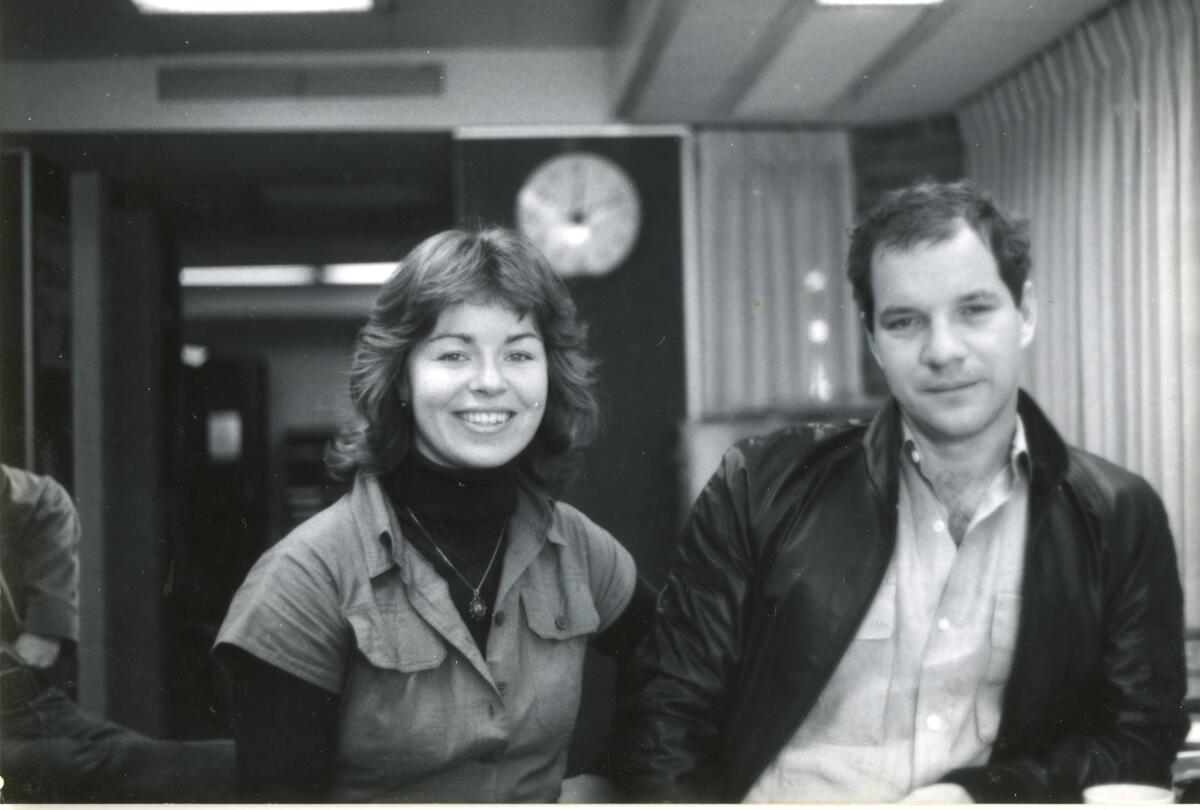
Patricia Rozema and Paul Schrader at Calvin College in Grand Rapids, Mich., in 1978.
(From Patricia Rozema)
And the way he spoke about wanting to change everything all the time was really exciting for me because I recognized it. Maybe it comes from having been raised in something that is so rigid, and then knowing that you’re somehow outside of it. That once you step outside of this very rigid belief system, anything goes, all the rules are suspect.
There’s this surreal element to a religious upbringing. Maybe coming from a world where you’re imbibing all of these quite dramatic, mythic images all the time makes you just play more outrageously. I didn’t have any film education. I studied philosophy at Calvin, so I didn’t have this idea of what film should be.
At this point in your career, what keeps you going? Do you feel like you’re the same independent filmmaker that you were when you made “I’ve Heard the Mermaids Singing”?
I feel like I’m really getting the hang of it now, partly because I’ve tried so many other things. I’ve tried something more arch and something in television too. I don’t care whether it’s streamers or features, it’s the story. The intent is all for me. I feel like the next ones could be better. I’m afraid of what this will look like in a newspaper, but I’m just going to try anyway. When did I ever hold back?
But at a certain point you just tell yourself, just make it good. And I feel like I can get to that faster now that I’ve made some things. I can cut to the chase more quickly. I feel like I’m just getting going. Lots of filmmakers, they just make another film because they can. And that’s nonsense. I would rather go for a walk.
40 years of ‘Desperate Teenage Lovedolls’

Hilary Rubens, left, Janet Housden and Jennifer Schwartz in the movie “Desperate Teenage Lovedolls.”
(Dave Markey)
On Monday night, the American Genre Film Archive will wrap up its 15th-anniversary series at USC with a 40th-anniversary screening of “Desperate Teenage Lovedolls” with filmmaker Dave Markey and cast members Jennifer Schwartz, Tracy Lea Nash and Redd Kross’ Stephen Macdonald all in attendance. (I’ll be moderating the Q&A.)
“Desperate Teenage Lovedolls” was shot on Super-8 for the grand total of $250, with many scenes being edited in-camera during filming. (The end credits note that Thrifty Drug, Sav-On and Fotomat processed the film.) Later this year, AGFA will release a five-film Blu-ray set of Markey’s restored early works, including “Lovedolls.”
The movie falls in with other titles of the period that documented a rebellious rock ’n’ roll spirit, including “Ladies and Gentlemen, The Fabulous Stains,” “Times Square,” “Foxes” and Markey’s acknowledged influences of Russ Meyer’s “Beyond the Valley of the Dolls” and the early films of John Waters.
The film is decidedly of its moment — “Our production design was the era,” Markey said in an interview this week — as movie theater marquees and posters in the background include “Flashdance,” “Yentl” and “Star 80.” There are references in the dialogue to “Risky Business,” Boy George and Mötley Crüe’s Nikki Sixx.
The story is an irreverent show-business satire about a trio of teenage runaways who form a band called the Lovedolls and hit it big, navigating their way around sleazy would-be managers, a rival girl gang and other obstacles.
“We were all kids that grew up in front of a TV set,” said Markey. “We are the generation, the latchkey kids, the TV set was our babysitter. So we were receiving for many years this kind of programming. And it just wasn’t the movies or the TV shows, it was the commercials, it was the culture that was being fed to us in this way.
“To me, that film was just sort of like a giant zit that built up, so to speak. And then the film was a release, a popping of that zit, everything just sort of coming right back out,” said Markey. “Especially in those teenage years where you’re trying to make sense of the world, it helped to try to understand it through making films.”
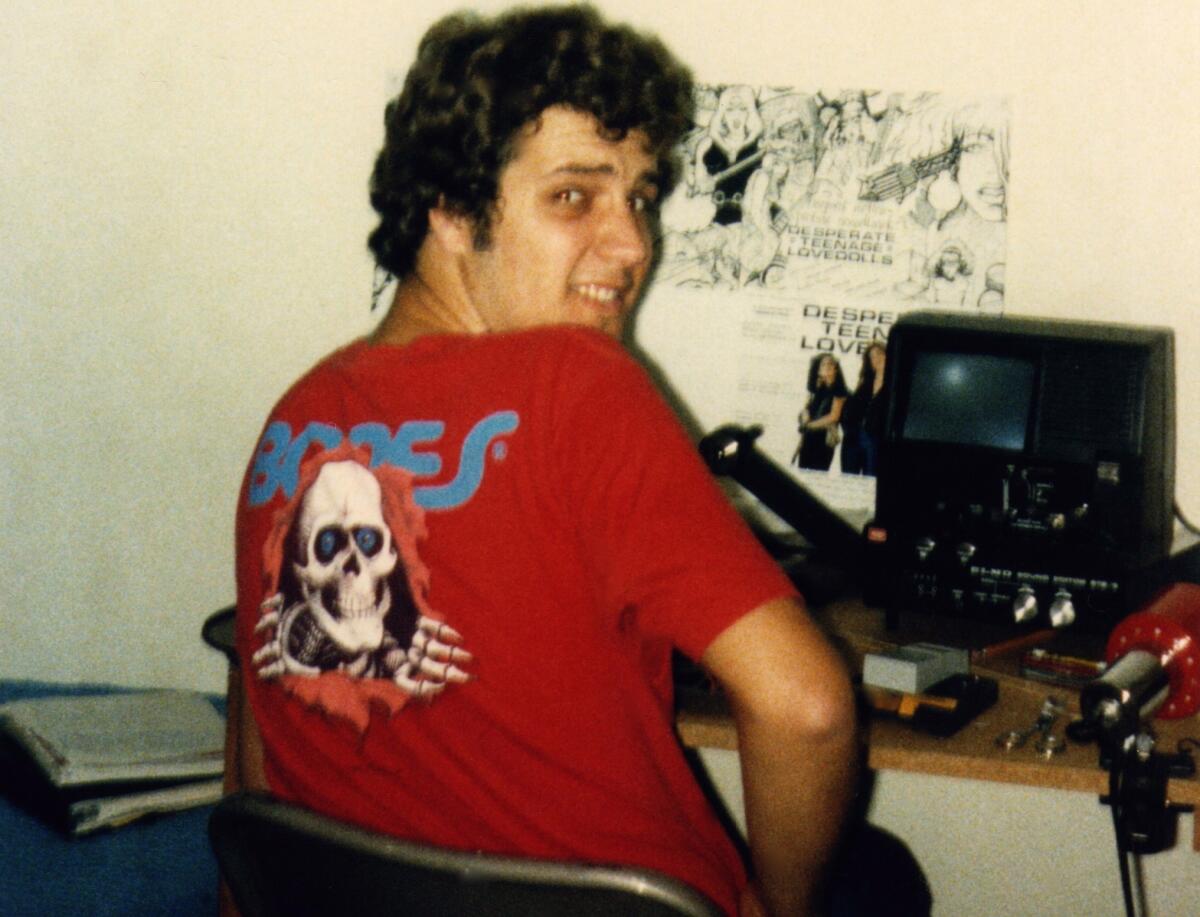
Filmmaker Dave Markey editing Super-8 footage.
(Mary Markey)
The hit song within the movie is a cover of the song “Legend (Come On Up to Me),” originally by all-girl L.A. band Backstage Pass, here performed by Redd Kross with original singer Joanna Spock Dean on vocals. Redd Kross also contributed the theme song “Ballad of a Lovedoll,” which would appear on their 1987 album “Neurotica.”
Markey would follow up “Desperate Teenage Lovedolls” with the sequel “Lovedoll Superstar” in 1986, made for the exponentially lavish sum of $10,000. Both “Lovedolls” movies would become cult hits once they were released on VHS. Markey would find his biggest success with the tour documentary “1991: The Year Punk Broke,” which inadvertently captured Nirvana right as the band ascended to superstardom.
But the moment captured by “Desperate Teenage Lovedolls” will always be distinct.
“For me, it’s kind of special because imagine if you could have your teenage years documented in such a way that it’s just kind of preserved,” said Markey, who was 19 when he began making the film. “And with time stuff just takes on different meanings, different contexts, stuff becomes history. There’s not a whole lot of Super-8 filmmakers that have the opportunity to have their works preserved. It’s like looking back at a window of my youth in a unique way.”
Other points of interest
Funny girls
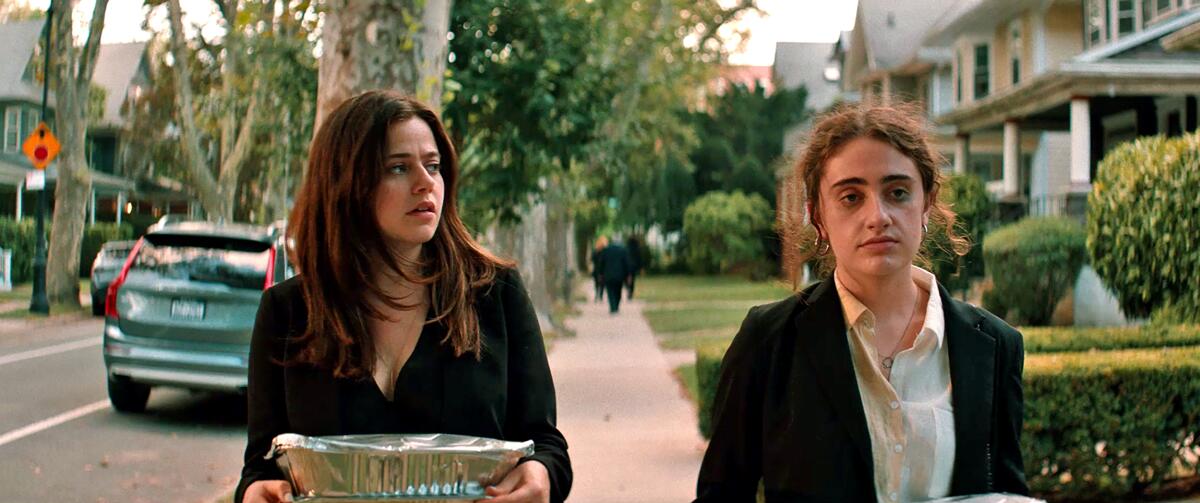
Molly Gordon, left, and Rachel Sennott in the movie “Shiva Baby.”
(Utopia)
With a touring production of the revival of “Funny Girl” just wrapping up its run at the Ahmanson Theatre, it makes sense that the Academy Museum will screen William Wyler’s 1968 movie adaptation. Barbra Streisand originated the part on Broadway and won an Oscar for her debut film role.
In his original 1968 review of “Funny Girl,” Charles Champlin wrote, “Miss Streisand as Fanny Brice is one of the great performances, one of the great congruences of personality and role, an interpretation perfected over the months onstage and enriched by the resources of the screen. The limitations of the vehicle are still there, but the lady at the wheel has got to be seen to be awestruck by.”
Champlin had spoken to Streisand a few months earlier. Ahead of making her movie debut, Streisand expressed a certain anxiety, saying, “It’s true, a film is the only thing that makes you immortal. Of course, if it’s bad, that’s not too good. You’re stuck with it forever.”
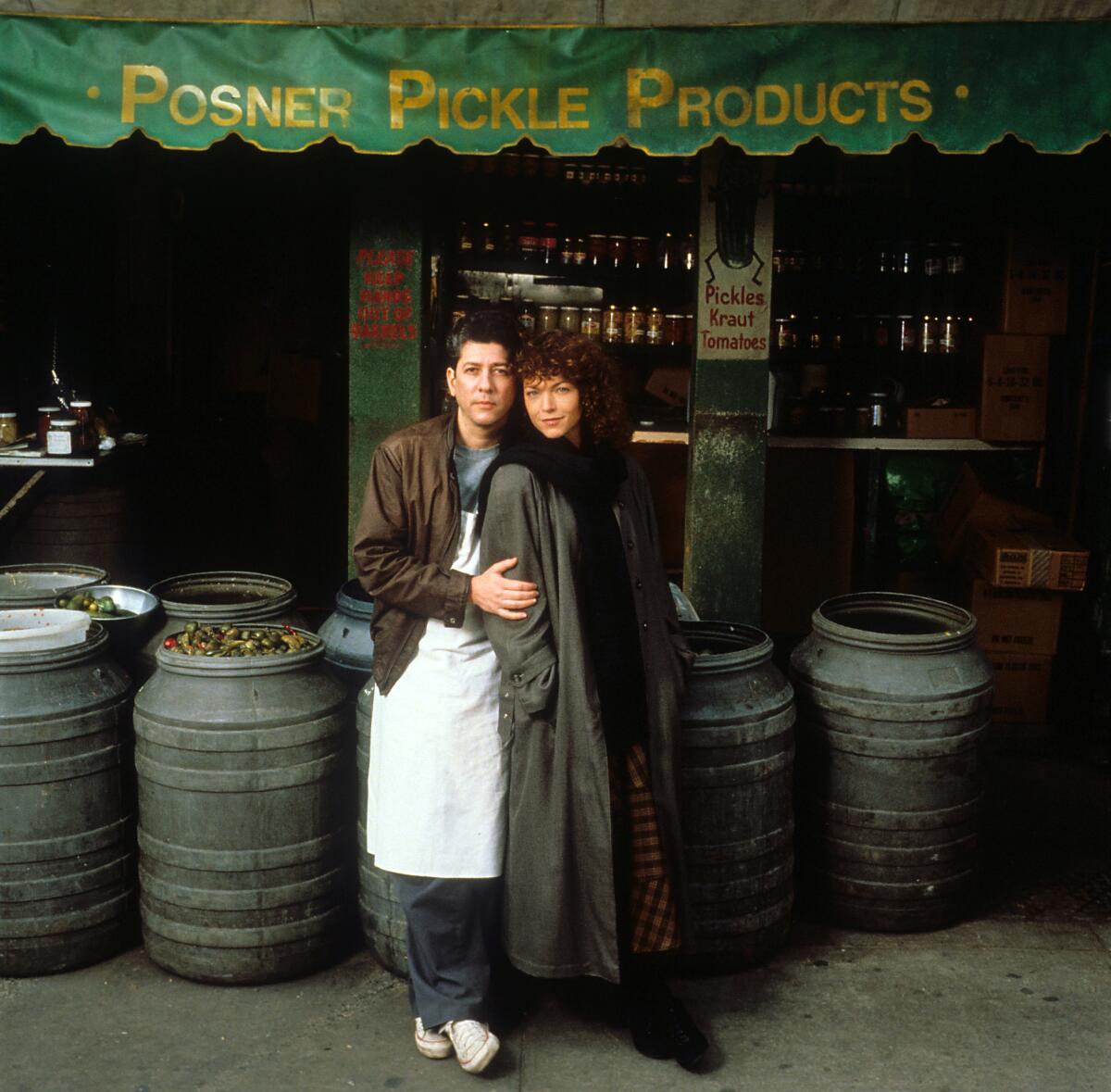
Peter Riegert and Amy Irving in a scene from the 1988 film “Crossing Delancey.”
(Warner Bros. via Getty Images)
The Academy has built a very sharp program around “Funny Girl,” which screens in a 4K restoration next Thursday, by spotlighting Jewish female talent in front of and behind the camera.
“The Great Ziegfeld” will screen in 35mm, as will the double feature of “What’s Up, Doc?” (also starring Streisand) and “Clue,” featuring Madeline Kahn and Lesley Ann Warren.
Other titles will include Elaine May’s feature directing debut, “A New Leaf,” on a double bill with a 35mm showing of Joan Micklin Silver’s “Crossing Delancey,” starring Amy Irving. Sandra Bernhard gives an astonishing performance in “The King of Comedy.” “The First Wives Club” and “Kissing Jessica Stein” also will screen in 35mm.
The series will conclude with two of the most original comedies of recent years, Emma Seligman’s “Shiva Baby” and Janicza Bravo’s “Lemon.”
Revisiting Lee Chang-dong

Ah-in Yoo, left, Jong-seo Jun and Steven Yeun in Lee Chang-dong’s “Burning.”
(Well Go USA)
The American Cinematheque is putting on a series of film by South Korean writer-director Lee Chang-dong, a number of them presented in new 4K restorations. Running through May 19, the series opens on Saturday with “Burning” at the Egyptian Theatre with actor Steven Yeun in attendance for a Q&A. (The event is already sold out, but there will be a standby line.)
At the Los Feliz 3, there will be screenings of “Secret Sunshine,” along with restored versions of “Peppermint Candy,” “Green Fish,” “Poetry” and “Oasis.”
In his 2018 review of “Burning,” former Times critic Justin Chang wrote, “With unusual rigor for an artist working in a visual medium, Lee explores the boundaries of what can and cannot be seen. In his emotionally shattering dramas ‘Secret Sunshine’ (2007) and ‘Poetry’ (2010), the director turned everyday images, such as a sunbeam striking a wall, into luminous existential riddles, challenging his characters to study them and glimpse the possibility of transcendence dwelling within. ‘Burning,’ Lee’s sixth feature and this year’s South Korean entry for the foreign-language film Oscar, continues this thematic investigation with extraordinary lucidity and intelligence, but also an abiding respect for its own mysteries.”
In other news
Lourdes Portillo dead at 80 Filmmaker and activist Lourdes Portillo died this week at age 80. Born in Mexico, Portillo received an Oscar nomination for her 1985 documentary “The Mothers of Plaza de Mayo,” about a group of Argentine women attempting to find out what happened to the thousands of people who disappeared under a brutal political regime.
Portillo, whose other films include “The Devil Never Sleeps” and “Corpus: A Home Movie for Selena,” was the subject of a retrospective and gallery exhibition just last year at the Academy Museum.
“The reality of living in the United States as an immigrant, it’s very painful, because the first thing that happens to you is that you realize that everybody’s trying to crush your sense of can-do,” Portillo told the Academy Museum in an interview. “Your sense of really being important in this society, having something to say. You’re already diminished.”
‘Challengers’ serves to audiences at last Having had its release delayed from last year by the actors’ strike, “Challengers” is finally in theaters. Directed by Luca Guadagnino from a screenplay by Justin Kuritzkes, the film is sleek, twisty and sensual in its telling of a tale of jealousy and power among three tennis players whose lives become intertwined. The movie stars Zendaya, Josh O’Connor and Mike Faist.
In a review for The Times, Amy Nicholson called the film “a trim, naughty, ferociously well-acted trifle.” Nicholson also noted that, with its frenetic camerawork by cinematographer Sayombhu Mukdeeprom and pounding techno score composed by Trent Reznor and Atticus Ross, “It takes subtlety and restraint and thwacks them over the fence and into the bushes.”
Melissa Barrera won’t be shut down While ostensibly promoting her new film “Abigail,” Melissa Barrera spoke to JP Brammer about losing her role in the “Scream” franchise over online comments that were perceived by some as antisemitic.
“It wasn’t easy to be labeled as something so horrible when I knew that wasn’t the case,” Barrera said of the accusations. “But I was always at peace because I knew I had done nothing wrong. I was aligned with human-rights organizations globally and so many experts and scholars and historians and, most importantly, Indigenous peoples around the world. I find that the Indigenous communities around the world are always on the right side of history, point blank, period.”
